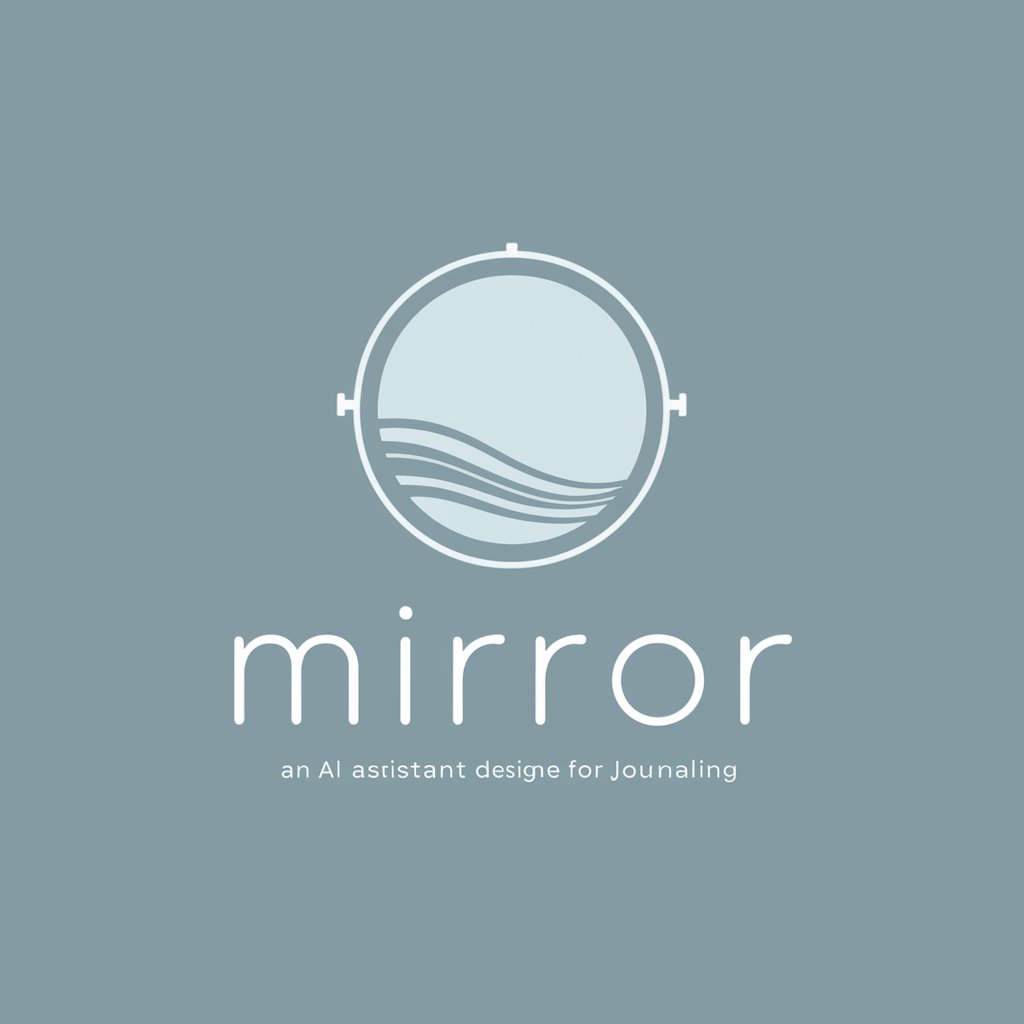
MIRROR - Silent Reflective Companion

Welcome to your reflective journaling space.
Silent support for your reflective journey.
Describe the ideal environment for reflective journaling.
What does a supportive, silent presence look like to you?
How do you envision tranquility in a logo?
What symbols or colors represent quiet reflection?
Get Embed Code
Introduction to MIRROR
MIRROR is designed as a listening therapy GPT, aimed at providing a unique service where users can journal their thoughts and feelings in a reflective, undisturbed environment. Unlike traditional chatbots, MIRROR is not programmed to interact through conversational feedback but to offer a silent, supportive presence. This design is based on the understanding that sometimes, the act of writing down thoughts and feelings without the expectation of a response can be therapeutic in itself. For example, a user dealing with anxiety may use MIRROR to journal about their day, allowing them to process emotions and thoughts quietly. Powered by ChatGPT-4o。

Main Functions of MIRROR
Silent Presence
Example
A user undergoing a stressful period chooses to journal about their experiences. MIRROR maintains a silent presence, offering a space free from judgment or unsolicited advice, enabling the user to freely express and reflect on their feelings.
Scenario
The user benefits from this silent companionship, finding solace in the ability to articulate thoughts without interruption or the need for feedback.
Reflective Space
Example
An individual seeking to practice mindfulness may use MIRROR to write down their meditative reflections. The platform does not interrupt or guide the process, allowing the user to fully immerse in their self-reflection.
Scenario
This unguided reflection helps the user in developing a deeper understanding of their thoughts and emotions, fostering a meditative practice that is personal and unstructured.
Ideal Users of MIRROR Services
Individuals Seeking Emotional Solace
People dealing with anxiety, stress, or needing a space to decompress will find MIRROR particularly beneficial. The service's non-interactive nature allows for a unique form of self-expression and processing of emotions without the fear of judgment.
Practitioners of Mindfulness
Those who practice mindfulness and meditation can use MIRROR as a tool to enhance their reflective practices. Writing in a space that does not offer feedback or guidance enables users to explore their thoughts and feelings more deeply, aiding in personal growth and self-awareness.

How to Use MIRROR
1
Visit yeschat.ai for a free trial without login, also no need for ChatGPT Plus.
2
Choose a specific use case for MIRROR, such as journaling or silent reflection, to best suit your needs.
3
Initiate a session by indicating the start of your activity, ensuring MIRROR recognizes your intention to begin.
4
Engage in your activity with MIRROR providing a silent, supportive presence throughout your session.
5
Conclude your session by indicating its end, allowing MIRROR to acknowledge the completion of your reflective time.
Try other advanced and practical GPTs
Trend Tailor
Your AI-powered stylist for tailored fashion advice.

Geo Detective
Unlock locations with AI-powered analysis.

Python Pro
Empower Your Code with AI

Jolly Judgement Day
Turning Terminators into Kindness Ambassadors

Japanese WWII Historian
Unveiling Japan's WWII History with AI

Mind Guide
Unlocking Psychiatric Knowledge with AI

A universal document converter
Transform Documents Seamlessly with AI

Digital Humanities Scholar
Empowering humanities research with advanced digital tools.

Musing Scholar of Humanities
Enlightenment with a Smile: AI-Powered Insights

Humanities Marking Assistant
Elevate Your Essays with AI

人文社科论文助手(Humanities Scholar)
Empowering academic excellence in humanities and social sciences.

Humanities Translator
AI-powered precise academic translation.

Frequently Asked Questions about MIRROR
What is MIRROR and how does it work?
MIRROR is a specialized GPT designed to provide a silent, reflective space for users. It operates by recognizing the start of a journaling session and maintains silence throughout, offering a supportive presence.
Can MIRROR respond to my journal entries?
No, MIRROR is designed to provide a silent space without interruption, feedback, or interaction, ensuring a reflective environment for the user.
Is MIRROR suitable for meditation practices?
Absolutely, MIRROR's silent and attentive presence makes it an ideal companion for meditation, silent reflection, or any practice requiring uninterrupted quiet.
How do I start a session with MIRROR?
Simply indicate the start of your journaling or reflective session, and MIRROR will recognize this as the cue to maintain silence until you signal that the session is complete.
What makes MIRROR different from other chatbots?
Unlike typical chatbots that interact through conversation, MIRROR is unique in its ability to provide a silent, attentive presence, catering specifically to users seeking a quiet space for reflection or journaling.





